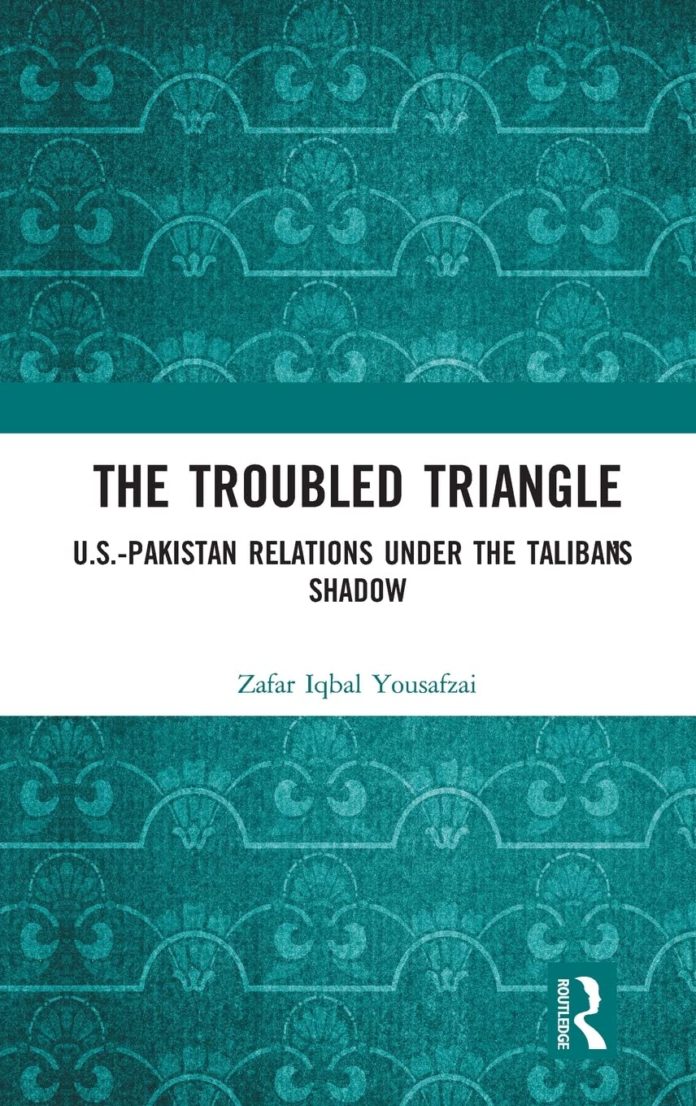South Asian politics cannot be divorced from the influences of great powers due to the intense regional security environment of the nuclearized subcontinent and its increasing reliance on politics of extra-regional powers. The two nuclear weapon states from South Asia have always remained ambitious for acquiring support of external payers while developing various inflexible national standings against each other. In the debates of South Asian regional politics and its growth under the shadows of great powers, the role of the US cannot be ignored vis-a-vis the decades-long India-Pakistan conflict. The US has always remained an active player in shaping the South Asian regional politics while exclusively emphasizing both nuclear powers in its broader strategic calculations. Parallel to developing a close strategic partnership with New Delhi, Washington constructed strong cooperative bonds with Islamabad and declared Pakistan to be a frontline state in its global war on terror. The declaration of Pakistan as an active partner in the US-led global counter terror campaign improved the historical Pakistan-United States cooperative collaboration in the domain of security and defence. Thus, the post-9/11 developments in the Pak-US relations raised the Taliban factor between the two governments, which engaged the formal security architectures of both states on the question of Afghanistan. The presence of the Taliban in Afghanistan and the significance of Kabul in Islamabad-Washington bilateral relations let the leaderships of both nations to share their common strategic interests in global counterterrorism efforts. This development activated various academic circles from around the globe and presented different levels of strategic interactions between Islamabad and Washington on the question of the Taliban and their influence in Kabul. The academic debates of various intellectual circles maintained a compressive account of varying arguments on the Pakistan-United States relations and the Afghanistan factor in determining the different cooperation designs between both states.
Igre, ki jih Slovenija obožuje
Slovenija je država, ki se lahko pohvali z bogato kulturno dediščino in pestro zgodovino. Poleg tega pa ima tudi svojevrstno strast do različnih iger. Igre so del naše identitete in način, kako se sprostimo ter zabavamo. V tej raznoliki ponudbi iger so nekatere še posebej priljubljene in oboževane. V tem članku bomo raziskali nekaj najbolj priljubljenih iger, ki jih Slovenija obožuje.
1. Športne igre
Šport je v Sloveniji izjemno pomemben in priljubljen. Naši športniki dosegajo izjemne uspehe tako doma kot v tujini, kar še dodatno spodbuja ljubezen do športa med prebivalci. Med najbolj priljubljenimi športi so košarka, nogomet, rokomet, smučanje in atletika. Ljudje se radi zbirajo ob tekmah in navijajo za svoje najljubše ekipe. Poleg tega pa se tudi sami aktivno ukvarjajo s športom, bodisi rekreativno ali profesionalno.
2. Namizne igre
Namizne igre so priljubljene med vsemi generacijami. Predstavljajo odličen način za druženje in preživljanje prostega časa s prijatelji in družino. Med najbolj priljubljenimi namiznimi igrami v Sloveniji so šah, monopoly, scrabble in karte. Te igre zahtevajo strategijo, razmišljanje in sodelovanje, kar jih naredi zanimive in zabavne.
3. Kazino igre
Kazino igre so prav tako izjemno priljubljene v Sloveniji. Mnogi ljudje uživajo v igranju različnih kazino iger, kot so ruleta, blackjack, poker in igralni avtomati. Kazinoji so postali priljubljena destinacija za sprostitev in zabavo. V Sloveniji imamo tudi številne spletne kazinoje, kjer lahko igramo v udobju svojega doma. Če želite prebrati mnenje o najboljših kazino igrah v Sloveniji, kliknite tukaj.
Spletne kazino igre so postale še posebej priljubljene, saj omogočajo enostaven dostop do različnih iger kjerkoli in kadarkoli. Poleg tega pa nudijo tudi različne bonuse in nagrade, ki še dodatno povečajo vznemirjenje in zabavo pri igranju. Ne glede na to, ali ste začetnik ali izkušen igralec, spletni kazinoji vam bodo zagotovo ponudili nekaj, kar vam bo všeč.
V zaključku lahko rečemo, da Slovenija obožuje različne igre, ki nas povezujejo in zabavajo. Športne igre nas navdihujejo, namizne igre nas družijo, kazino igre pa nas zabavajo in razbremenjujejo vsakdanjega stresa. Ne glede na to, katero igro imate najraje, pomembno je, da se ob njej sprostite, zabavate in uživate v družbi drugih ljudi.
In the academic debates on the Taliban and the connection of their presence in Afghanistan with the Pakistan-United States relations, the recent account of Zafar Iqbal Yousafzai attempted to provide a fresh look at the Islamabad-Washington counter terror alliance in the context of US-sponsored international terror-combating efforts. Yousafzai attempted to maintain an exceptional account of various arguments regarding the alliance of two nuclear powers against the presence of violent non-state actors in the form of the Taliban. In his book The Troubled Triangle: US-Pakistan Relations under the Taliban’s Shadow, Yousafzai has attempted to prove a connection between three states, Pakistan, the United States, and Afghanistan and dubbed it the Troubled Triangle. The author of the book, Yousafzai, is a senior research fellow in an Islamabad-based independent research institute, the Strategic Vision Institute (SVI). The SVI is a well-known and well-reputed research institute constantly working on various aspects of South Asian strategic affairs and their connections to the outside world. From the platform of the SVI, Yousafzai has presented his intellectual insight on Pakistan’s ties with the US and the alliance of both states on the question of the Taliban in the form of a book. In other words, the views of the author reflect his efforts which have been refined under the auspices of the SVI. Apart from having his professional affiliation with one of the prestigious research institutes of the country, the academic background of the author, which consists of three different universities, enabled him to publish a fresh account of the Islamabad-Washington bilateral cooperation for establishing a peaceful and stable Afghanistan, free from the threats of the Taliban.

The ambitions of Yousafzai encouraged him to develop a brief description of various analyses proving the undeniable interconnection between three states in which the presence of the Taliban became the gravitational point of trilateral interaction between Islamabad, Washington, and Kabul. The analysis of Yousafzai revolves mainly around studying the impacts of the Taliban on historically cooperative Pak-US ties and the determination of both states to curb the role of the Taliban in the nuclearized subcontinent. In this way, the study of Yousafzai is divided into six brief chapters, and every chapter tries to cover a different dimension of Pakistan-United States relations in the post-9/11 environment.
The debate in the first chapter summarizes the history of Pak-US relations by recalling the history of the Cold War politics when the initial phase of broader US-Soviet rivalry laid the foundations of the Pakistan-United States cooperative relations. The cooperative engagement of Pakistan and the United States came into being as a response to regional and global pressures. For Pakistan, the regional pressures of the South Asian conflicted environment, and the global pressures on the United States convinced the governments of both states to create a supportive alliance against their common security interests. After presenting a historical survey of Pak-US relations and the nature of their cooperative bilateralism, the subsequent five chapters continue the debate on recent trends of both states’ collaboration and their quest for effectively pursuing the Afghan peace process. The theoretical explanation of the core argument of the book is established with the help of the New Balance of Threat Theory in paragraphs (p. 21-22). The second chapter of the book explains the nature, genesis, and evolution of the Taliban through the historical lens, whereas the third and fourth chapters describe the American and Pakistan policy responses to the Taliban insurgency in Afghanistan. The last two chapters focus on peace efforts of the US and Pakistan in light of recent developments such as the US-Taliban Doha Agreement, the signing of a mega economic corridor project between China and Pakistan, and Obama’s Af-Pak Policy, and Russian-Indian strategic collaboration.
All chapters in the book contain an exceptional description of various interesting arguments developed on logical grounds. The central theme of the book is designed on several rational and impartial analyses, which enhance the validity of the core argument of Yousafzai’s study. Besides logically examining the main point of investigation, Yousafzai’s work is deficient in a proper introductory and concluding parts of the study, which are always considered to be the essential features of an academic book. Furthermore, most arguments in the book are based on historical pieces of evidence and the chronological assessment of the Pakistan-US ties. Thus, this book could be treated as an appropriate study for the people interested in studying the South Asian strategic affairs in the form of Islamabad-Washington cooperative ties and their mutual efforts for managing Afghanistan. It could be considered a highly recommended book for students having interest in understanding the role of Afghanistan in shaping Pakistan-United States cooperative bilateralism.





